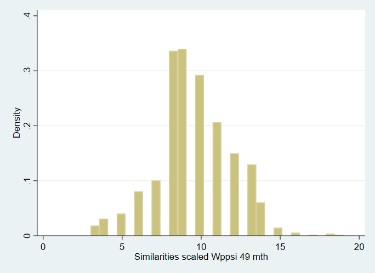The Avon Longitudinal Study of Parents and Children (ALSPAC) assessed their cohort members (CMs) at 49 months’ age (Children in Focus Clinic) using the Similarities measure from the Wechsler Preschool and Primary Scale of Intelligence Revised (WPPSI-RUK).
Details on this measure and the data collected from the CMs are outlined in the table below.
| Year of data collection: | 1996-1997 |
| Domain: | Verbal ability |
| Measures: | Verbal comprehension |
| Verbal reasoning | |
| Language development | |
| CHC: | Gc (Crystallised intelligence) |
| CLOSER Source: | Explore this sweep in CLOSER Discovery: ALSPAC Early Years (13 months to 4 years 11 months) (opens in a new tab) |
| Administration method: | Trained interviewer; clinical setting; oral response |
| Procedure: | This test consisted of two parts. First, the child was shown six pairs of images, and asked to state the similarity between the two. For the remaining items (7 - 20), the interviewer asked the child whether they knew how two different concepts were related, e.g. "In what way are red and blue alike?". Items 1 - 12 were worth one point each, with the remaining items worth 0 - 2 points. If items 1, 7, or 13 were answered incorrectly, the interviewer demonstrated the correct answer. |
| Link to questionnaire: | http://www.bristol.ac.uk/alspac/researchers/our-data/clinical-measures/ (opens in new tab) |
| Scoring: | Standardised score (M = 10, SD = 3) |
| Item-level variable(s): | Not readily available |
| Total score/derived variable(s): | cf810 Explore this variable in CLOSER Discovery: ALSPAC Children in Focus 4Mth-61Mth Clinics Dataset (opens in a new tab) |
| Descriptives: | Raw score |
| N = 992 | |
| Range = 3 - 19 | |
| Mean = 9.53 | |
| SD = 2.40 | |
(click image to enlarge) |
|
| Age of participants (weeks): | Mean = 212.39 weeks, SD = 1.63, Range = 207-221 |
| Other sweep and/or cohort: | BCS70 – Age 10 – BAS Word Similarities* |
| MCS – Age 11 – BAS II Verbal Similarities* | |
| ALSPAC – Age 8.5 – WISC-III Similarities* | |
| (* All are word/verbal similarities only, i.e. did not include component on picture similarities.) | |
| Source: | Wechsler, D. (1989). Wechsler Preschool and Primary Scale of Intelligence-Revised. WPPSI-R. Psychological Corporation. |
| Technical resources: | Kaufman, A. S., & Lichtenberger, E. O. (2000). Essentials of WISC-III and WPPSI-R assessment. John Wiley & Sons Inc. |
| Example articles: | Bornstein, M. H., Hahn, C. S., Bell, C., Haynes, O. M., Slater, A., Golding, J., ... & ALSPAC Study Team. (2006). Stability in cognition across early childhood: A developmental cascade. Psychological Science, 17(2), 151-158. |
| Taylor, C. M., Kordas, K., Golding, J., & Emond, A. M. (2017). Data relating to prenatal lead exposure and child IQ at 4 and 8 years old in the Avon Longitudinal Study of Parents and Children. Neurotoxicology, 62, 224-230. |
For the named item in the table above, a link is provided to the corresponding CLOSER Discovery content.
Go to:
- Overview of all cognitive measures in ALSPAC
- Overview of childhood cognitive measures across all studies
This page is part of CLOSER’s ‘A guide to the cognitive measures in five British birth cohort studies’.
